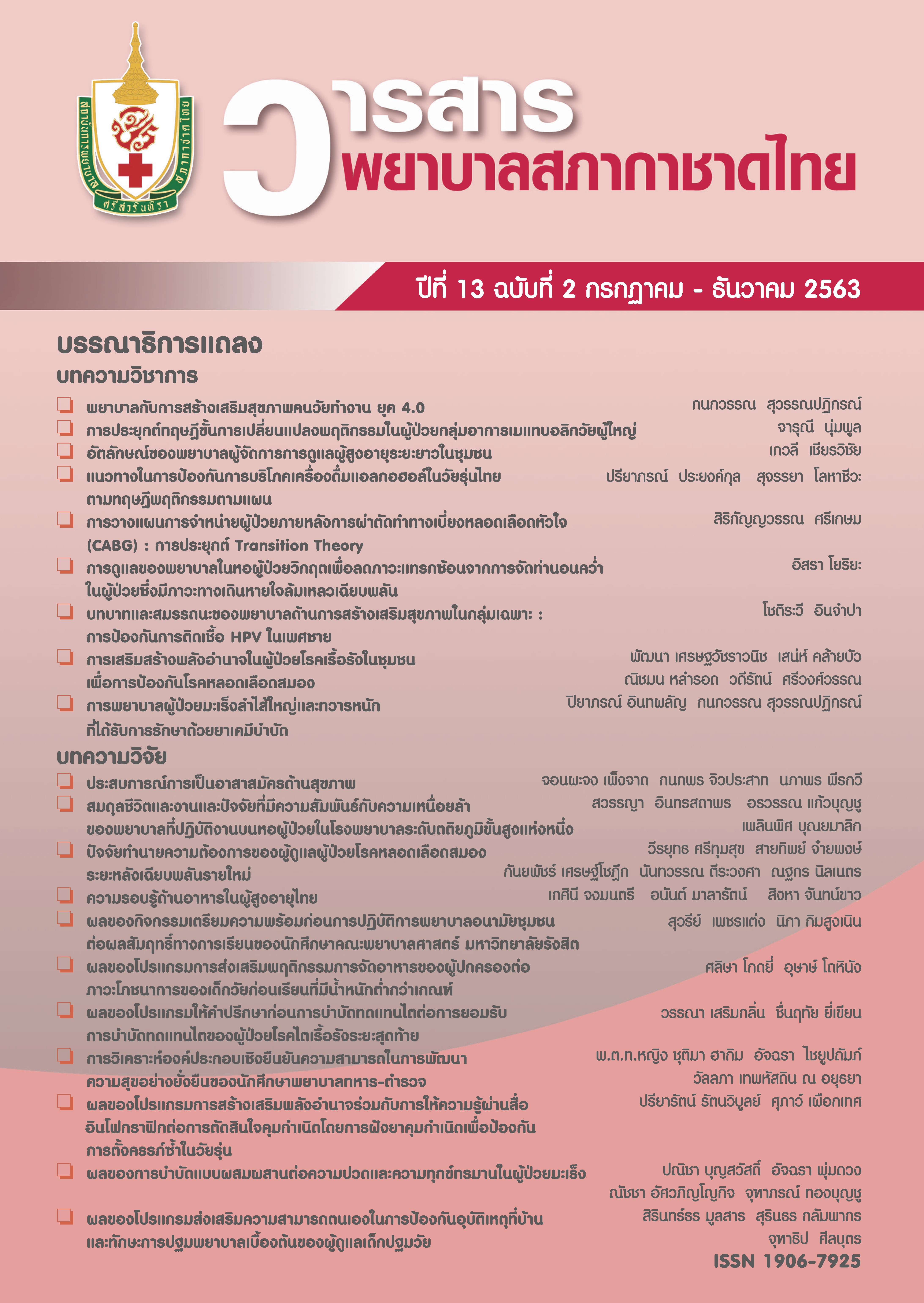Factors Predicting Needs of Caregivers of New Patients with Post-Acute Stroke
Keywords:
caregiving burden, caregiver’s needs, post-acute strokeAbstract
This study is predictive research aimed at exploring the correlation between the burden of caregiving, the needs of new caregivers to stroke patients, and predictive factors of those caregivers. The research subjects consisted of 90 caregivers to new stroke patients admitted to Phrachomklao Hospital in Phetcahburi province. Purposive sampling was used according to set inclusion criteria. The research instruments were questionnaires consisting of three parts, including 1) caregiver’s demographic data 2) burden of caregiving assessment, and 3) caregiver’s needs assessment. The content validity of the questionnaire was tested by three nursing experts. The reliability of the burden of caregiving assessment and caregiver’s needs assessment was tested by Cronbach’s alpha coefficient, with results of 0.8 and 0.92 respectively. Data analyses was done by using descriptive statistics, Pearson’s product moment correlation coefficient, and multiple linear regression.
The results revealed that the average score for burden of caregiving was at the middle level (Mean = 41.53, S.D = ± 26.89). The caregiver’s needs were also found to be at the middle level (Mean = 3.25 score, S.D. = ± 0.36). There were two statistically significant caregivers’ needs: including more information regarding the patient care (p-value < .001), and rest time while taking care of the patient (p-value < .05). Level of education and caregiver income were two co-predictors of caregiver needs, at 10.7 percent and significant difference at .01. The level of education (β=-.300) is more highly predictive of caregiver needs than income of caregiver (β=.219). The results of this study suggest that health care providers should be concerned about the needs of new stroke patients’ caregivers identified by this study, which include the provision of health information and arranging adequate rest time in order to minimize the burden of caregiving among new stroke patients’ caregivers.
References
2. Division of Non-Communicable Diseases, Department of Disease Control, Ministry of Public Health. Annual report 2018 [Internet]. 2018 [cited 2019 Jun 14]. Available from: http://www.thaincd.com/document/file/download/paper-manual/AnnualNCD61.pdf (in Thai)
3. Camak DJ. Addressing the burden of stroke caregivers: a literature review. J Clin Nurs 2015;24(17-18):2376-82.
4. Gbiri CA, Olawale OA, Isaac SO. Stroke management: informal caregivers’ burdens and strains of caring for stroke survivors. Ann Phys Rehabil Med 2015;58(2):98-103.
5. Mahinda LW. Evaluation of the informal caregiver burden in the care of stroke patients at Kenyatta national hospital [Thesis]. Nairobi: University of Nairobi; 2016.
6. Wilz G, Kalytta T. Anxiety symptoms in spouses of stroke patients. Cerebrovasc Dis 2008;25(4):311-5.
7. Katbamna S, Manning L, Mistri A, Johnson M, Robinson T. Balancing satisfaction and stress: carer burden among White and British Asain Indian carers of stroke survivors. Ethn Health 2017;22(4):425-41.
8. Toonsiri C, Sunsern R, Lawang W. Development of the burden interview for caregivers of patients with chronic illness. Journal of Nursing and Education 2011;4(1):62-75. (in Thai)
9. Notkao D, Kaewmanee C. Factor influence caregiveer burden of stroke caregivers. Paper presented at: The 1st Ratchathani University National Conference; 2015 July 29; Ratchathani University, Ubon Ratchathani, Thailand. (in Thai)
10. Chuaoupathum R. Nursing care need of caregivers for stroke patients at home [Thesis]. Nakornpathom: Christian University; 2010. (in Thai)
11. Akosile CO, Banjo TO, Okoye EC, Ibikunle PO, Odole AC. Informal caregiving buden and perceived social support in an acute stroke care facility. Health Qual Life Outcomes 2018;16(1):57. doi: 10.1186/s12955-018-0885-z.
12. Kuptniratsaikul V, Thitisakulchai P, Sarika S, Khaewnaree S. The burden of stroke on caregivers at 1-year after discharge: a multicenter study. J Thai Rehabil Med 2018;28(1):8-14. (in Thai)
13. Tsai P-C, Yip P-K, Tai JJ, Lou M-F. Need of family caregivers of stroke patients: a longitudinal study of caregivers’ perspectives. Patient Prefer Adherence 2015;9:449-57.
14. Yu Y, Hu J, Efird JT, McCoy TP. Social support, coping strategies and health-related quality of life among primary caregivers of stroke survivors in China. J Clin Nurs 2013;22(15-16):2160-71.
15. Muthucumarana MW, Samarasinghe K, Elgan C. Caring for stroke survivors: experiences of family caregivers in Sri Lanka – a qualitative study. Top Stroke Rehabil 2018;25(6):397-402.
Downloads
Published
Issue
Section
License
เนื้อหาบทความหรือข้อคิดเห็นต่างๆ ในวารสารพยาบาลสภากาชาดไทยนี้ เป็นความคิดเห็นของผู้เขียนบทความ ไม่ใช่ความเห็นของกองบรรณาธิการ หรือสถาบันการพยาบาลศรีสวรินทิรา สภากาชาดไทย






